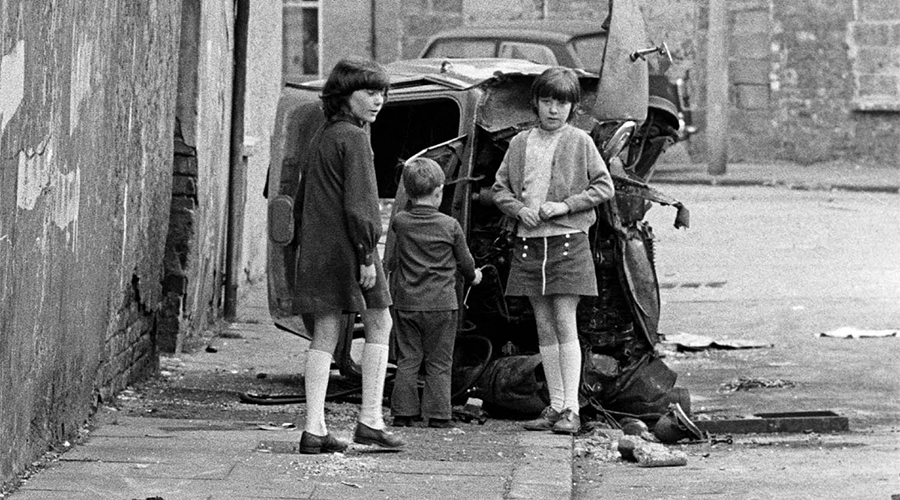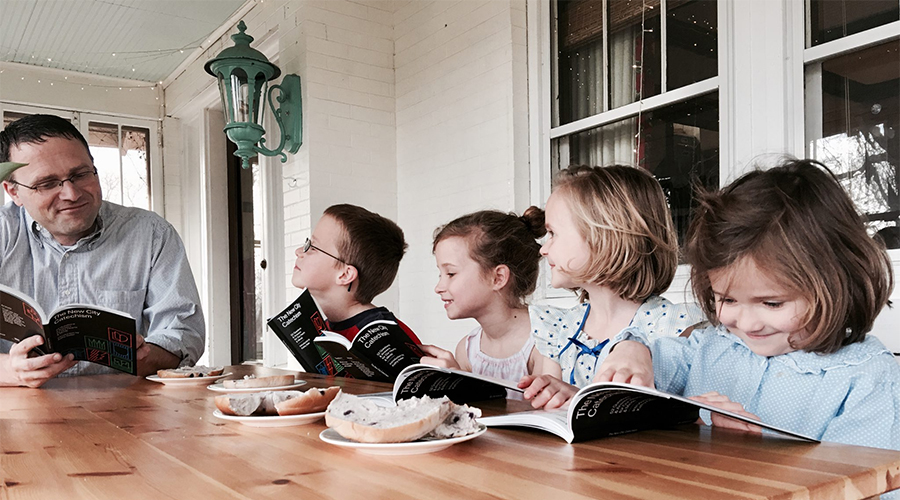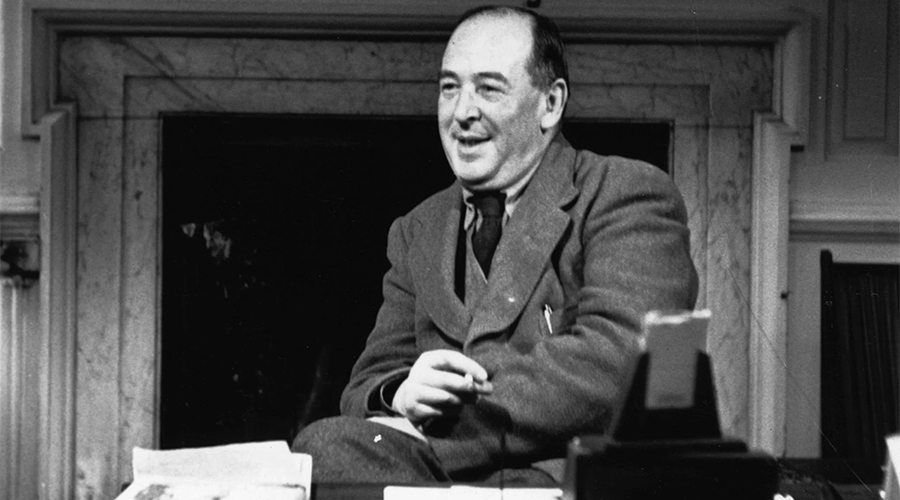 Cultivating truth, goodness, and beauty grounded in the Christian worldview
Cultivating truth, goodness, and beauty grounded in the Christian worldview Cultivating truth, goodness, and beauty grounded in the Christian worldview
Cultivating truth, goodness, and beauty grounded in the Christian worldview

In August of 1969, a communal riot called The Battle of Bogside erupted in the town of Derry, Northern Ireland. This violent altercation between Loyalists and Irish nationalists would initiate a 30-year violent struggle now known as the Troubles. Although misleading and unfortunate, the most common adjectives used to define the two opposing forces are Catholic and Protestant. Recently, I read an excellent book called Say Nothing by Patrick Radden Keefe. Keefe brings to light many of the horrific stories that help explain the tragic consequences of sectarian, political violence. For someone with no connection to the conflict, I found it difficult to identify the "good guy" and "bad guy" in the confusing struggle. In the world of fantasy literature, Tolkien, Lewis, and Rowling make it easy to draw the line between good and evil. However, it is not always so easy to draw such distinctions in our own world. More than a few times, my children have asked me who is the good guy in a sporting contest or a national conflict. Keefe describes well the motive for the violence in Ireland, "Outrage is conditioned not by the nature of the atrocity but by the affiliation of the victim and the perpetrator." I did not anticipate that I would be considering the application of the Troubles to our current political environment. Few would disagree that often the outrage we are witnessing in our times is more connected to the victim and the perpetrator and less about the nature of the atrocity. How can we best prepare our children to live in this divisive world? Christian author Ed Stetzer says, "The answer for Christians in the age of outrage is not some silver-bullet study that will give a new piece of knowledge. Rather, it begins with looking at our habits, the things that we love every day through our choices and actions." I would encourage Christians to focus on the cultivation of three habits in our children to confront our society: worship first, fight hard, and use self control.
One of the attributes glaringly absent from the Troubles of Ireland was honest and fervent Christian devotion. The people most engaged in violence were not a people committed to worship, prayer, and repentance. Although professions of Christian loyalty were not infrequent, true Christian worship was clearly subservient to the greater political cause. What loyalties do our children see as most precious in the lives and actions of their parents and teachers? In their eyes, are we Republicans or Democrats first or more importantly followers of Christ? Where do we place our ultimate trust and hope? This means we need to be a people committed to the gathering of the Christian saints and exalting the name of our sovereign Lord, King Jesus. Do they see us praying more often than protesting? We must encourage our children to shape their political identity on their Christian identity and not the other way around. Do they see us more outraged with our own sin than the sins of others? The fruit of Christian worship is evident to the world in how we repent of our own sin. It should not surprise us to find more conflict as the flame of Christian worship continues to flicker in the wind.
The takeaway from this moment as parents cannot be to discourage our children from fighting for Christian truth. Jesus fought often against the hypocrites (Matthew 21:12-13), Paul waged war against the unbelief of his age (2 Corinthians 10:3-4), and reformer Martin Luther boldly battled against the heresies of his time. And yet, the word fight can be used in a variety of contexts. Martin Luther King Jr. was one of the great fighters of the 20th century. He was a bold fighter but not like the violent fighting of the belligerents in Northern Ireland. We need to train our children to see and call out evil based on the nature of the atrocity and not the color of their jersey. Let us train our children to fight for the true, good, and beautiful.
Last, the conflicts of our time are often defined by a lack of self control. Of the many words we can use to describe the events of January 7th, self control can't be one of them. We are a culture in desperate need of self-control and this has been made painfully clear over the past twelve months. In Proverbs 29:11 we read, "A fool gives full vent to his spirit, but a wise man quietly holds it back." Many events of the past year have been a full venting of the spirit (lower case s). The virtue of self-control or temperance was so highly regarded in ancient Greece that it was included as one of the four cardinal virtues along with prudence, justice, and fortitude. Aristotle said, "I count him braver who overcomes his desires than him who conquers his enemies; for the hardest victory is over self." The virtue of self-control is not a trendy virtue (like creativity, grit, or tolerance) but I believe it will be an essential trait for our children.
Let us listen to the call of Paul to the church in Ephesus, "Look carefully then how you walk, not as unwise but as wise, making the best use of the time, because the days are evil. Therefore do not be foolish, but understand what the will of the Lord is."

I remember hearing the word catechism when I was about 19 and thinking, "What in the world is a catechism?" Even though I had been raised in the church, this word was foreign to me. For all I knew, it could've been referring to a dire disease destroying our feline population. The idea of training Christian children with an archaic set of formalized questions and answers likely seemed too restrictive to our modern minds. However it happened, catechisms have been relegated to the trash heap of antiquated ideas along with Blockbuster movies and Blackberry phones. A catechism is defined as "a summary of the principles of Christian religion in the form of questions and answers, used for the instruction of Christians." The reality is that all of our children are being catechized every day. At home, in the classroom, on the playground, at summer camp, and at youth group, our children are being trained to think and believe fundamental ideas about the essential questions of human existence: Why are you here? Who are you? What is love? What is good? What is just? Who is God? or even Is God? Therefore, it is essential that Christian parents consider how they are catechizing their children in their formative years. We use a catechism at Stonehaven because we believe these words will instill in our children a view of this world that aligns with God’s holy word. A common objection to a catechism is that it can become a rote ritual exercised without true conviction. Are you just saying the words or do you truly mean it? Is this not possible with the training of any good habit? Couldn't our children be tempted to say please and thank you without truly meaning it? Even though we know this is a likely result, it certainly does not keep us from constantly reminding our children to say thank you. In the little years, a catechism will often be recited without a full understanding of the deeper implications of the words. The 44th question in our school catechism asks, "What is justification?" The answer is, "It is God regarding sinners as if they had never sinned." What a heart-rending and beautiful truth of the gospel! I'd be surprised if our second graders comprehend the profound meaning of justification every time they say the answer. Even so, we trust that God is working in them little by little to have a greater appreciation of Christian truth as their minds and hearts gain the capacity to understand these beautiful truths.
There are likely many Christian families wondering how they can realistically begin a new family habit when the children are accustomed to a world without catechism training in the home. Here are four principles for how you can begin a healthy family habit with a catechism:
You'd be surprised at how much can be done in three minutes just before dinner-time. Ask three or four questions from Stonehaven's catechism or another catechism (Westminster Shorter, Heidelberg, The New City) and start with easy questions that your children know. It is possible this will not be an exciting addition to your family routine so you will want to get creative on how you can bring some joy to the exercise. Maybe you take a dinner roll, an apple, or a broccoli and throw it around to your children as they answer the questions. Consider some simple rewards system like ice cream or Nintendo Switch playing time that help motivate participation. Make the habit special by celebrating milestones as they progress through the benchmarks in the catechism. Make a habit of doing it at the same time every day so that it becomes a part of the fabric of your family routine. There are so many different ways this can be done well. Each family will want to continually reassess how they are training their children to take in Christian truth so fully that it becomes not simply a set of abstract propositions but rather a part of their identity as a human being. Ultimately, we are praying that our children can grow up to believe fully the answer to the first question in the Heidelberg Catechism.
Q. What is your only comfort in life and death?
A. That I am not my own, but belong—body and soul, in life and in death—to my faithful Savior, Jesus Christ. He has fully paid for all my sins with his precious blood, and has set me free from the tyranny of the devil. He also watches over me in such a way that not a hair can fall from my head without the will of my Father in heaven; in fact, all things must work together for my salvation. Because I belong to him, Christ, by his Holy Spirit, assures me of eternal life and makes me wholeheartedly willing and ready from now on to live for him.

When I was young, my parents enjoyed watching the classic 80's sitcom Cheers. One of the episodes I found more memorable was when postal worker Cliff Clavin found himself as a contestant on Jeopardy. With categories catered to Clavin's particular interests like "Stamps from Around the World" and "Bar Trivia", he enters the final round with $22,000: a score more than twice that of his closest competitor. Any Jeopardy enthusiast knows that the smart move in this situation is to wager either $0 or some nominal amount to ensure victory. True to his know-it-all nature, Clavin wagers and loses every dollar with the unforgettable answer, "Who are 3 people who've never been in my kitchen?" Even as a young child, I understood the absurdity of his all-in wager. Too often schools will take untested and large gambles in a desperate attempt to find a shortcut to educational success. In his book Great by Choice , Jim Collins seeks to answer an important question for our current times, "Why do some companies thrive in uncertainty, even chaos, and others do not?" In the fourth chapter, Collins discusses his second principle which he calls empirical creativity. Collins illustrates the essence of his point with the analogy of a warship firing test bullets before using its limited supply of gunpowder on a larger cannonball. He says, "A bullet is a low-cost, low-risk, and low-distraction test or experiment. 10Xers use bullets to empirically validate what will actually work. Based on that empirical validation, they then concentrate their resources to fire a cannonball, enabling large returns from concentrated bets." Many schools have gambled big like Cliff Clavin on unproven educational philosophies including sight reading, new math, common core, student-centered classrooms, and excessive forms of digital learning. I am familiar with one school that placed a big bet on technology. Another school placed an inordinate amount of hope in the development of its athletics program. With the pressing need for success, both schools fired "uncalibrated cannonballs" that ultimately missed their mark over time. The challenge before our school right now and in the coming years is to patiently and thoughtfully test our creative ideas providing the necessary validation of its future success.

It is common to see athletes perform various rituals as part of their game-day routine. The great third baseman for the Red Sox, Wade Boggs, performed a litany of eccentric rituals in his own preparation. He woke up at the same time each day, ate chicken before each game, fielded exactly 117 ground balls in practice, took batting practice at 5:17, ran sprints at 7:17, and wrote the Hebrew word Chai ("living") in the dirt before each at bat. Were these seemingly frivolous routines the reason he became one of the great hitters of all time? Although they certainly are not the primary reason, could they have been a contributing factor? There is a reasonable argument that rituals can enhance an athlete's confidence, improve their attention, and increase motivation. Research shows that, "Superstitious rituals enhanced people's confidence in their abilities, motivated greater effort ─and improved subsequent performance." A year or two ago, someone shared with me a video of Barry White Jr., a fifth-grade teacher in North Carolina, who created a personalized handshake ritual with each of his students as they entered the classroom. The coordination and interaction between him and his students is impressive. Most agree that this daily routine undoubtedly helps prepare his students to have a positive attitude for learning in his classroom. I believe God has created our souls to yearn for rituals. A ritual is defined as, "a religious or solemn ceremony consisting of a series of actions performed according to a prescribed order." The Bible outlines an abundance of rituals designed to assist his covenant people in their effort to commune with God. This means that teachers must consider what rituals are embedded into the ethos of their classrooms. Similarly, parents ought to be creating rituals for their children that help define what it means to be a member of their family. These rituals can be used to motivate healthy dispositions towards doing household chores and completing homework. They can also be powerful aids in nurturing important spiritual disciplines that we want to see established in our children at a young age.
The encouragement to cultivate rituals must be balanced with another thematic element throughout God’s word. In Matthew 15:8, Jesus condemns those that hold to the ritual and yet forsake the more important purpose of obedience to God... "This people honors me with their lips, but their heart is far from me." In Psalm 51, God emphasizes that sacrifices without obedience are worthless. God’s people will forever be tempted to believe that the ritual is sufficient for righteousness. As the apostle Paul would say, “May it never be!” And yet, God never condemns the ritual itself but rather the motive of the heart. We might laugh at the image of Pharisees emptying precisely a tenth of their spice jars as they tithe mint, dill, and cumin (Matthew 23). It is important to note that Jesus is not condemning that peculiar practice but rather that the Pharisees are prioritizing this behavior above the "weightier matters of the law." We are to employ rituals in the lives of our children to help cultivate healthy practices of devotion and worship. As we do so, let us articulate clearly and often the purpose of these rituals to our children. It is inevitable that some will confuse the ritual for the purpose but we can see Biblically this is a risk we can not eliminate.
What might some of these rituals look like? When managing chores for our younger children, the movie Mary Poppins comes to mind. Ms. Poppins seeks to teach the children that "an otherwise unpleasant situation can be pleasant when a pleasant aspect is deliberately introduced." Rituals of singing, dancing, and some application of competition can often make chores more bearable for our children. Such rituals will require coordination, planning, and full participation from parents. Several years ago, I read through a book called Raising a Modern-Day Knight by Robert Lewis. One of the premises of the book is that well-orchestrated rites of passage can help celebrate and emphasize the virtues of responsibility and discipline that we want to see developed in our young men. The ceremonies advocated by Lewis would be at the conclusion of critical milestones in the life of a young man. Milestones achieved through hard work and perseverance. Lewis says, "One of the great tragedies of Western culture today is the absence of this type of ceremony... I cannot even begin to describe the impact on a son's soul when a key manhood moment in his life is forever enshrined and memorialized by a ceremony with other men." The beauty of such rituals is that they will not only benefit the spiritual disciplines of our children but will also certainly have a significant impact on our own sanctification.

At Stonehaven, we often speak lightheartedly about the confusion and chaos of the middle school years. As educators, we have spent a lot of time around these unique creatures and with wide eyes we think it prudent to warn our younger parents to buckle up and prepare for a wild adventure full of confusion, insecurity, and foolishness. I believe one measure of God's grace is how little we remember of our own bewildering journey through that awkward phase of our own childhood. One affliction during these years is an overconfidence in one's own brilliance. As newspaper columnist Dave Barry says, "When a boy reaches 13 years of age, the Knowledge Fairy comes around and inserts into his brain all the information in the entire universe. From that point on, he no longer needs any parental guidance. All he needs is parental money." When we banter about these years in a playful manner, the takeaway is not that there is little parenting we can do to fight these inevitable challenges. As a former pastor mine said in a sermon, "Parenting little ones takes much grace. Raising teenagers requires a different kind of grace. And God provides grace like manna." The warning is simply a heads up that confusion is likely around the corner and you'd be wise to put both hands on the steering wheel and plan now for how you should react. What are we to do? Proverbs 22:15 provides the answer, "Folly is bound up in the heart of a child, but the rod of discipline drives it far from him." Foolishness is rampant during these years and the answer is not to ease up on the pedal of discipline. However, how we discipline our older children should naturally change with their age. When my daughter was three years old, I did not sit her down to discuss at length the logic of her sin. As our children grow older, we will rely upon deep conversations impressing upon their hearts the sinful nature of their actions and behaviors. Conversations that are full of honest truths, hard-to-hear truths, designed to challenge our children towards greater virtue.
Certainly punishments ought to continue but that alone is not enough to nurture virtuous behavior in our children. Punishments alone will rarely be sufficient to provide the desired repentance in our children. Hebrews 12:11 reminds us that, "For the moment all discipline seems painful rather than pleasant, but later it yields the peaceful fruit of righteousness to those who have been trained by it." Discipline is painful for our children and if we desire success, we must be immersing our children in a family community defined by love. We will need to make some significant "discipline" withdrawals with our children and we should be filling up their emotional account with love and grace at every possible opportunity. Daughters during these years need special, devoted time from their fathers. A monthly date night is one of the many ideas that can help our young women feel loved and secure. Mothers would be wise to include their daughters in activities and events directed towards women. The bonds made during such activities are the necessary down payments for future discipline. I would wager that the most important word for how our sons should feel during these years is respect. They are yearning to be listened to, understood, and valued as they wrestle with the great questions of life. Our sons and daughters should be given meaningful opportunities for leadership and decision-making in family affairs. These actions create thick relationships with our children that help foster productive discipline when it is necessary.
What can we be doing during the little years to prepare our children for these years? Two thoughts. First, it is crucial that we are developing self-control in our children when they are young so that this habit is well trained for the young adult years when temptations will certainly abound. A child that has been given everything when they are young will naturally have little defense for the greater sins of adulthood. Proverbs 25:28 says, "A man without self-control is like a city broken into and left without walls." Second, we should be showing our children an abundance of affection. Our children need both physical affection and emotional affection that communicates clearly our love for them. Hugs should be distributed liberally and meaningfully. This affection is crucial in building up a foundation of trust that you will need to lean on as they grow into their young adult years.
The Cliff's Notes: Love, discipline, love... repeat.

What if I invited you to enjoy your Friday evening at a local pub deliberating the cardinal virtues with a friend of mine named C.S. Lewis? Or maybe a Saturday afternoon meal at the Busy Bee Cafe discussing human dignity with another friend named Martin Luther King Jr.? How about tea time at Serenbe Farms debating the complexity of human relationships with Jane Austen? It might be difficult to explain the many distinctive aspects of a classical Christian education. However, I have found our appreciation for the value of Great Books to be one of the easiest. Even though the unique opportunity of meeting physically with these great thinkers can only be imagined, we truly have a blessed opportunity of engaging in a conversation with them when we read their classic works. Author Mark Haddon says, “Reading is a conversation. All books talk. But a good book listens as well.” The more I read, the more convinced I am that the words on the page and the ideas they promote are embedding themselves into the DNA of my soul. We often hear, "you are what you eat." The classical Christian philosophy of books argues that, "you are what you read." To use a whimsical expression from Tolkien, what we read forms "the leaf-mould of the mind." If you desire to grow in truth, goodness, and beauty, then you ought to start spending more time with those writers that best articulate these virtues. One of my favorite Narnian quips is from The Voyage of the Dawn Treader when Lewis says, "Most of us know what we should expect to find in a dragon's lair, but, as I said before, Eustace had read only the wrong books. They had a lot to say about exports and imports and governments and drains, but they were weak on dragons." Where do our children learn what it looks like to be brave, courageous, and sacrificial? Probably not by reading a pedantic treatise from Vandelay Industries on the economic impact of exporting and importing. The cultivation of virtue happens when we immerse our children's imagination into a world like Middle Earth and allow Tolkien’s words to paint a surreal picture of courage through the perilous journey of Frodo and Sam. The best way to encourage this in our children is to join them on their literary journeys by reading great literature as well.
"We must seek what is most worthy in the works of both the past and the present. When we do that, we find that ancient poets, prophets, and philosophers are as much our contemporaries in the world of the mind as the most discerning of present-day writers. In fact, many of the ancient writings speak more directly to our experience and condition than the latest best sellers." - Mortimer Adler
"You think your pain and your heartbreak are unprecedented in the history of the world, but then you read. It was books that taught me that the things that tormented me most were the very things that connected me with all the people who were alive, who had ever been alive." - James Baldwin
"But in reading great literature I become a thousand men and yet remain myself. Like a night sky in the Greek poem, I see with a myriad eyes, but it is still I who see. Here, as in worship, in love, in moral action, and in knowing, I transcend myself; and am never more myself than when I do." - C.S. Lewis
"In the case of good books, the point is not to see how many of them you can get through, but rather how many can get through to you." – Mortimer J. Adler
"Outside of a dog, a book is a man’s best friend. Inside of a dog, it’s too dark to read." - Groucho Marx

In the 1972 Munich Olympics, 800-meter runner Dave Wottle found himself in last place after the first lap of the two-lap race. If anyone were to pause the race at the halfway point and ask their friend, "Who wins this race?", you could only guess correctly knowing it was a trick question. With a jaw-dropping final lap, Wottle would pass all runners in front of him to win the gold medal. He would clock virtually even 200-meter split times of 26 seconds: in other words, his race was an impressive example of consistency and discipline. As I continue through Jim Collins book Great by Choice , the third chapter unpacks the idea of fanatic discipline: the first of a triad of core behaviors exhibited by organizations that thrive during seasons of chaos and uncertainty. Collins defines discipline as "consistency of action-consistency with values, consistency with long-term goals, consistency with performance standards, consistency of method, consistency over time." Wottle was placed in a position of uncertainty and fear on the first lap when he was well behind all the other runners in the race. He would later say, "There was a little bit of terror in the beginning because I found myself so far behind. I was eight to ten meters behind and I felt, I'm just out of it." Yet, he demonstrates a remarkable discipline in holding back. The organizations Collins studies in his book show a similar restraint and discipline. In 1996, with business booming, Southwest Airlines had more than 100 cities clamoring for Southwest to expand their service to their cities. They ended up opening up service in only four cities that year. Collins says, "Southwest had the discipline to hold back in good times so as not to extend beyond its ability to preserve profitability and the Southwest culture." Our school has been blessed over the past several years with a season of 'good times.' What a blessing to have more children and families enjoy the truth, goodness, and beauty of a Stonehaven education. At the same time, we are committed to a fanatic discipline that will be cautious of allowing our school to grow too fast. It is easy to think of all the things our school might be able to do if we were bigger. It is more challenging and probably more important for us to consider what we might lose if we were to grow too fast.

Theologian N.T. Wright says, "Character is a slowly forming thing. You can no more force character on someone than you can force a tree to produce fruit when it isn't ready to do so. The person has to choose, again and again, to develop the moral muscles and skills which will shape and form the fully flourishing character." I have found it tempting to believe virtue could be developed purely by knowledge and understanding. If I could just get my hands on the right book, listen to an insightful sermon series, or find the right Christian mentor. Could I not make some giant virtue leap forward? Even though I have found each of these activities valuable, they are merely pieces of a much more complex puzzle for the flourishing of our souls. As Wright argues above, virtue is a slowly forming thing requiring the never-ceasing development of our moral muscles. The most decorated marathon runner of all-time, Eliud Kipchoge, runs more than 120 miles each week. Every twenty mile workout likely has an almost imperceptible impact on Kipchoge's overall fitness. And yet, over time, every mile contributes to his becoming the greatest marathon runner of the modern era. Kipchoge says, "Only the disciplined ones in life are free." It is estimated that elite golfers often hit more than 1,000 balls in a single day. Michael Jordan attempted 24,537 shots in his career (he missed more than he made) and this does not include shots attempted in practice. Does it not make sense that the formation of our character would require the same fanatical discipline and commitment? As we train up our children, we aim to instill in them an understanding that the development of their character will take hard work, consistent training, and perseverance over time. The pursuit of Godly character begins every morning when our children wake up and continues every moment of the day. We are provided the awesome privilege as their parents and teachers to help train their moral muscles to appreciate and love goodness.

In Psalm 146:3 we are commanded to, "Put not your trust in princes, in a son of man, in whom there is no salvation." This past weekend I saw a billboard that boldly proclaimed that, "Only God and Donald Trump can save this country." The name of the candidate is irrelevant: it could've been Joe Biden, Nelson Mandela, or Abraham Lincoln. This billboard expresses a view of politics rampant on both sides of the political aisle: a misplaced hope and trust in the saving power of politics. A result of the hope of the gospel is that the salvation of our world is not dependent on sinful man. How does Stonehaven plan on training our children to navigate the complex and divisive world of politics? First, we want to teach our children to place their ultimate hope and joy in the Lord (Psalm 37:4-6, Nehemiah 8:10). We need look no further than many examples from the 20th century to find the failure of depending upon the government for salvation. Second, we aim to teach our children to understand that politics, with all its faults, is a good and necessary thing. As Winston Churchill quipped, "Democracy is the worst form of government except for all the others." God uses politics and politicians for his good purpose. In Proverbs 21:1 we are assured that, "The king's heart is a stream of water in the hand of the Lord; he turns it wherever he will." Third, we aim to train our children how to faithfully apply God's word to politics, including how they vote. It is inevitable that certain candidates will govern in a more God-honoring way than other candidates. The policies, ideas, and views promoted are not all created equal. Some are good, others are bad, and others are just plain evil. It is our job as parents and teachers to engage in the conversation and debate that will help our children faithfully discern good and evil amidst the chaos of our current political climate.

The year was 1923, and British runner Eric Liddell found himself pushed to the ground just after the start of a 440-yard race. Liddell, whose story was made popular by the movie Chariots of Fire , hesitated for a moment thinking he was disqualified. Encouraged by his coach to continue, Liddell began what observers might have considered a foolhardy effort to catch the other runners who were now 20 yards down the track. With his head back and arms flailing wildly, he passed the leader of the race a few yards before the finish line to complete a truly remarkable comeback. He would be unconscious from exhaustion for the next thirty minutes. Liddell was known for having terrible running form, one observer would say he resembled "a stricken stag." Even with his poor running form, Liddell possessed a relentless will to win. One appropriate adjective defining how Liddell ran, and also how he lived his life, was scrappy. Scrappy is defined as "having a strong, determined character, and willing to argue or fight for what you want." A few months ago, a teacher at Stonehaven said, "You know what I love about Stonehaven? We're scrappy." I was impacted by the word choice both because it is not a word often used to define a school and secondly it was a refreshing compliment regarding the shared ethos of our school community. As we go into the coming months and years, I want to leverage the scrappiness of our school community in a strategic way. One of the Stonehaven shout outs reminds us that, "Many hands... make light work!" For years our school has dreamed of things we could do in our own building and property. In the coming month, we will be moving into the Upper School campus and ushering in a new season of opportunities for our school. Utilizing the scrappiness of our community, what kind of beautiful, creative, and amazing things can our 'many hands' create for our children? For all those Stonehaven DIYers out there, please read the DIO Committee blurb below to see how you can join us in the design, planning, and creation of amazing things for our school.
